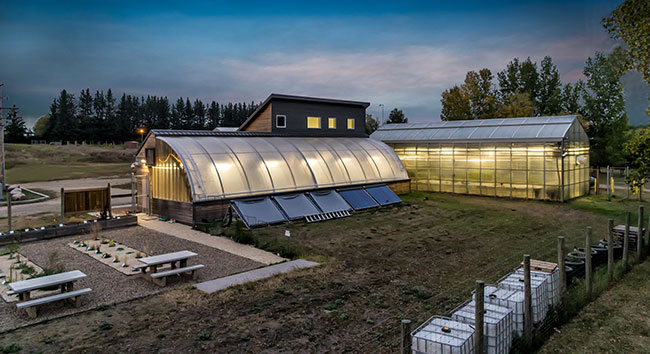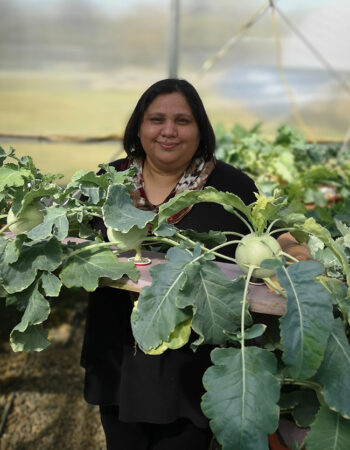
Features
Advancing horticulture production through research and education
Assiniboine Community College research supports Manitoba’s agri-food industry
January 11, 2024 By JANE DE PAUW, DRS. POONAM SINGH AND SAJJAD RAO
 Assiniboine Community College’s sustainable greenhouse complex, which opened in the spring of 2013, is home to the Horticultural Production and Sustainable Food Systems programs.
PHOTO: Assiniboine Community College
Assiniboine Community College’s sustainable greenhouse complex, which opened in the spring of 2013, is home to the Horticultural Production and Sustainable Food Systems programs.
PHOTO: Assiniboine Community College Assiniboine Community College (ACC) was established in 1961 as the Brandon Vocational Training Centre, later becoming the Manitoba Vocational Training Centre and finally Assiniboine Community College in 1969. ACC is an accredited college within the Province of Manitoba offering more than 90 certificate, diploma, advanced diploma, and apprenticeship programs to over 3,200 full-time students in Brandon, Dauphin and Winnipeg, as well as at rural rotating sites throughout the province.
ACC has grown over the years, developing a new campus on the North Hill in Brandon where the College’s sustainable greenhouse complex opened in the spring of 2013. The greenhouse facility is home to applied research as well as the Horticultural Production and Sustainable Food Systems programs. Assiniboine’s expansion continues at the North Hill Campus with the development of the Prairie Innovation Centre for Sustainable Agriculture.
Assiniboine Community College has been conducting applied research supporting Manitoba’s agri-food industry since 2010, with activity growing rapidly from a small cluster of highly committed researchers to encompass research programs, partnerships, and a reputation for solving problems, developing and improving technologies, services and processes. Since 2018, ACC has received nearly $7 million from government, private and not-for-profit partners, along with personnel time, facility access, equipment, and materials. ACC has worked with more than 70 partners in the last 10 years including businesses, industry associations, not-for-profit, Indigenous, industry-government consortia, academia and various local, provincial and federal government departments.
The College’s horticulture applied research is led by Drs. Poonam Singh and Sajjad Rao. Drawing from extensive experience in horticultural sciences. Singh’s primary research interests encompass the development of sustainable technologies for greenhouse-based production of horticultural crops. Her work involves the development/assessment of innovative soilless media and substrates, rootzone management of greenhouse crops, cultivation of hydroponic crop systems, exploration of vertical farming techniques, and the study of horticultural crop physiology. With a demonstrated ability to spearhead research and development projects for the industry, Singh excels in leading initiatives aimed at advancing sustainable practices and enhancing the production efficiency of horticultural farms. She has a substantial track record of publishing numerous research papers in well-regarded academic journal and presenting at national and international conferences. Dr. Singh is also recipient of numerous prestigious grants, including funding from The Natural Sciences and Engineering Research Council of Canada (NSERC), the Canadian Agricultural Partnership (a federal-provincial initiative, Govt. of Canada), Ag Action Manitoba; Employment and Social Development Canada, Agriculture and Agri Food Canada, and the Shastri Indo Canadian Institute, Canada.
Singh’s current work is focused on:
- Developing peat-reduced media blends using waste and by-products of the agricultural and timber industry such as wood fibres, plant fibres, composts, and biochar for horticultural crop production. Her work involves standardizing protocols for determining bio-physiochemical characteristics, and to explore them as potential components of sustainable growing media that could serve as a viable option for potted plant cultivation and hydroponic vegetable production.
- The evaluation of the suitability of new growing media blends for plant growth and development under protected growing systems. Studies focus on optimizing growing novel partner-supplied media blends for plant growth in the greenhouse and high tunnels to grow crops such as tomatoes, peppers, strawberries, cucumbers, cucurbits, pepper and eggplants.
- Utilizing plant growth regulators that enhance the capacity of plants to combat biotic and abiotic stresses affecting horticultural crops within the controlled environments of greenhouses and high-tunnels. The objective is to optimize yield and quality, improve health and vigor, and enhance the adaptability of horticultural crops to challenging environmental conditions.
- Examining the fundamental parameters necessary for the effective operation of an innovative modular freight container farm designed for growing leafy greens. This investigation includes a comparative analysis with traditional greenhouse-based growing systems, aiming to evaluate and contrast their respective operational characteristics.
Dr. Sajjad Rao is an accredited agricultural professional with over two decades of experience in R&D innovations and academic program development and execution. Rao’s research focusses on climate changing agriculture, sustainable food production technologies, novel crop genetics development & technology commercial acceptance programs to address and overcome producers’ challenges and foster new business opportunities for food production and processing industries. Rao has made significant contributions in sustainable crop production technology innovations for controlled environmental horticulture and developed practices & protocols for climate positive field crop production. Rao developed a novel spring wheat variety suitable for the Canadian Prairies and is well published in the impact of greenhouse microclimates on plant growth and yields, effect of solar energy on greenhouse climates, and varietal studies in strawberry and sweet potato propagation in greenhouse and field environments.

Dr. Poonam Singh in the research greenhouse at Assiniboine Community College.
Rao’s current work is focussed on:
- The evaluation of climate-positive technologies for year-round crop production examining the effect of varied greenhouse design and operation methodologies on crop production parameters (days to flower, days to maturity, total yield; nutrient profile as determined in the research lab) which impact the bottom line of commercial horticulture production. Studies investigate low-cost sustainable technology for greenhouse environmental controls and plant growth performance, climate and plant data acquisition, monitoring and communication systems for maintaining optimum greenhouse climates leading to sustainable crop production systems and optimizing year-round plant performance. Analyses are applied to greenhouse crop yield models for different crop performance under different low, medium and high-tech inputs and protocols.
- Studying the production needs of specific fruit and vegetable crops and identify best performing varieties for Western Canada growers. Research studies and identifies strawberry varieties best suited to early berry production in protected cultivation. Advanced greenhouse management equipment is being used to record and analyze real-time sensor data on temperature, humidity, light spectrum, light intensity, water use efficiency and other growing parameters to adjust light spectrum, intensity or angle, vents, curtains, and other greenhouse components.
- Exploration of greenhouse operations and crop potential and nutrient levels for produce increasingly in demand by Chinese, South Asian, and Afro-Caribbean communities. To meet rising demand, okra, long beans, long and round eggplants, and bitter melon are being tested in the spring and summer when passive solar greenhouse creates warmer conditions suitable to grow these crops.
- Production needs are being explored and nutrient and anthocyanin levels of purple carrot varieties (culturally important crop for Indigenous communities) tested in the research laboratory to identify the best variety to use in production. Anthocyanins have antioxidant, anticarcinogenic and anti-inflammatory properties that protect from the risk of cancer, heart disease, diabetes and cognitive function disorders.
ACC remains committed to a collaborative partner-driven planning process to identify opportunities and respond to industry challenges in various parts of the food system and is using the resulting data to shape and expand its applied research focus for the coming decade. For more information or to connect with Dr. Rao or Dr. Singh, please visit assiniboine.net/community/about-us/applied-research or email ACC-AppliedResearch@assiniboine.net.
Print this page